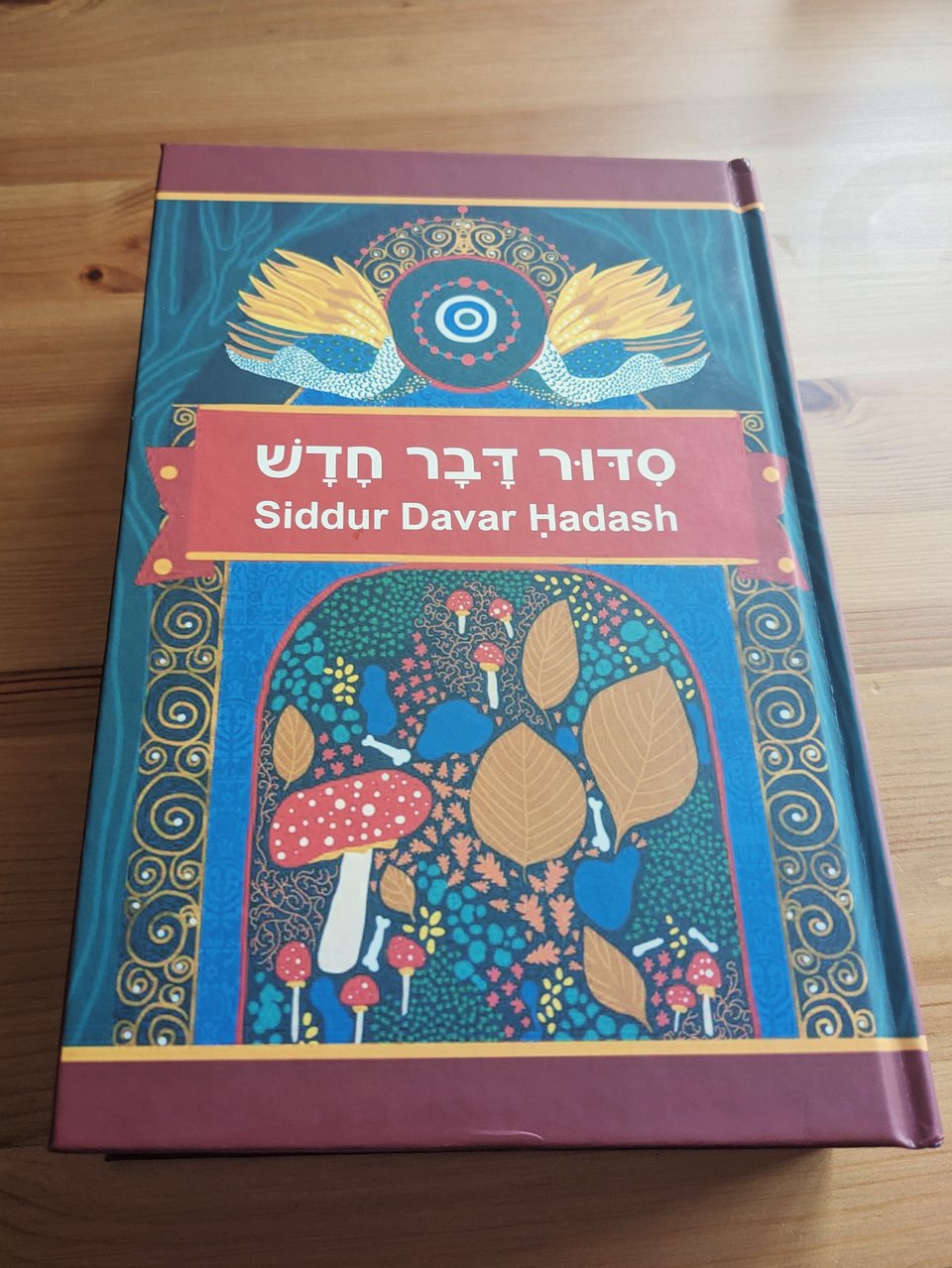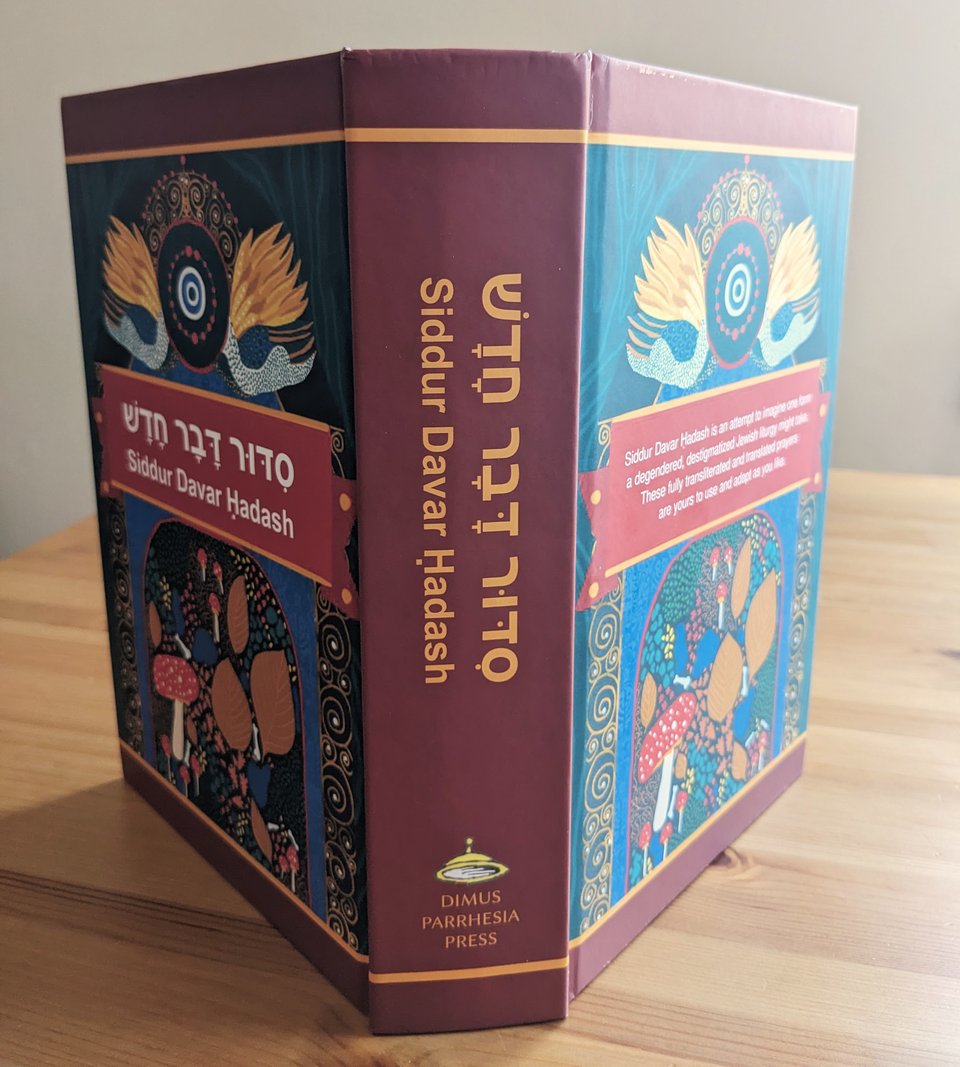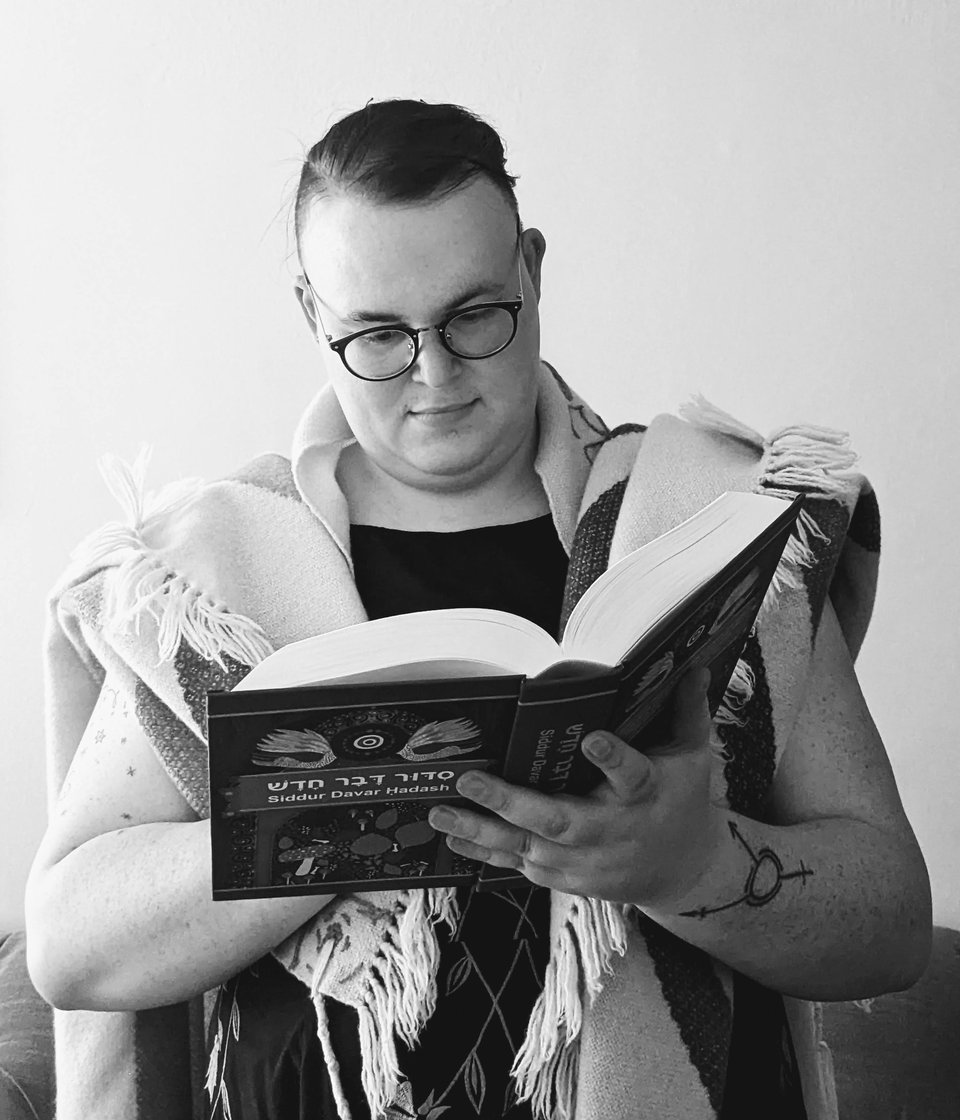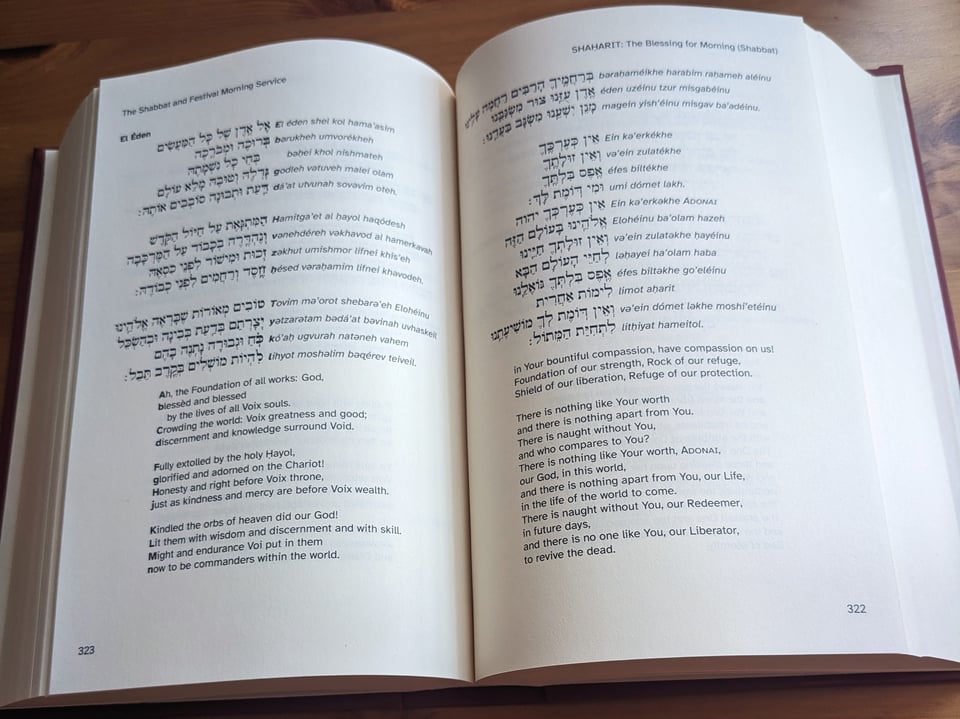[brinspotting] Siddur Hard Copies Available!
Today, brin has been spotted…
With a physical copy of Siddur Davar Ḥadash!

That’s right! Thanks to the good folks at Dimus Parrhesia Press, you can now get your very own hard copy of Siddur Davar Ḥadash. We’re selling these at cost, but if the price is still a hurdle for you, e-mail me and I’m sure we’ll be able to work something out. (And if you’d like to pay it forward to help cover the cost of someone else’s copy — or just to help me keep the lights on — you can kick a few bucks my way on PayPal here.)
Siddur Davar Ḥadash started as a very personal project, a small ad-hoc thing, I thought, to maybe pass around with a few close friends. In working on it, it grew and grew into something I’m still not sure I fully grok the size of. There have been more than a few moments where the path ahead seemed simply endless. There was an almost meditative quality to some of the hours spent nudging vowels around and bolding alphabetical acrostics, a feeling that there would always be another psalm in the queue and that that was fine, that I had been immersed in an unbounded ocean of intricate texts and my lot was simply to tinker with them carefully until the mainspring of the universe wound down and all dissolved into an even wash of dissipating static.

So it’s a little surreal to have the final product in a form I can just. Hold. Right here. In my own two hands.

More than anything else, I am filled with gratitude in this moment. I may have been the only person tapping away at my computer keys, but I could not have made it to this point without the help and support of so many people — too many, by far, to name. To everyone who encouraged me, answered my questions, taught me, kept me housed and fed, and otherwise sustained and deepened my life: Thank you. This work is yours in some part too.
What's next
Those of you who have heard me talk about this project at length know that since the outset, I’ve been planning on adding additional volumes after the first. The next on the list is the weekday siddur, and after the mountain of the shabbat and festival one, there’s not much work left to do there. There are a couple weekday-only sections, a couple extra psalms, and an additional blessing here and there, but all in all, it’s a pretty small lift to get there from where I am now. It’s mostly just a matter of copying, pasting, and deleting things we only do on Holy days.
However.
That copying and pasting is also a problem.

For Volume 1, I started by putting the entire siddur together in an enormous plaintext file. Then, once I was happy with the text, I set about reformatting that plaintext file first into HTML and then into PDF. This took forever — adding all the <p></p> tags and \begin{hebrew} markers added about five months to the process — and was also extremely tedious; it felt like exactly the kind of mechanical work we invented computers to do for us. To make matters worse, tho, it also means that I now have three “original” copies of the text: one that’s a plaintext file, one that’s coded for HTML, and one that gets used to generate the PDF (which is also the version that’s printed and bound).
Having three copies of the text to work with is annoying — if I find a typo, now I have to hunt it down three times instead of just fixing it once — but it’s actually considerably worse than that, since so much of the text is actually repeated in the siddur itself. The opening paragraphs of the qadish show up in seventeen different places in the siddur, so if, G-d forbid!, I find a typo there, suddenly I have to track that typo down fifty one times across all three documents.
That’s an extreme case, but there are plenty of other texts that show up three or four times in the siddur and are multiplied accordingly. And once you start adding in multiple volumes that share text between them, that multiplication really starts getting out of hand. If I’m on volume five and need to tweak something in haTəfilah, suddenly I’m looking at having to make the same edit (without introducing any new errors!) on the order of 100 times.
This feels like setting myself up for failure.
So what’s the alternative? The ideal situation would be a setup where I could have one source file, hit a button, and have my computer do all the mechanical work of adding all the HTML and LaTeX tags and whatnot. This would also let me have one copy of the qadish text that I could just automatically fetch and drop in — I could just put a little note saying “hi computer! please print the qadish here!” and it would be taken care of. That way, if I wanted to change that text when I was deep in volume 5, I’d have to change it once instead of 200+. Which would be very nice!
And I think I have found something that will let me do that: It’s called Pollen, and it was created specifically with the idea that an author should be able to have one source document with their actual text and then have the computer take care of all the fussy, mechanical formatting details needed to turn that into any number of different final output files for real world use. It sounds very cool! I’m very excited about it! And also I think making it work will require a level of Coding Facility that I simply do not yet have.
So now I am. Uh. Teaching myself to code? In order to continue working on a series? Of prayerbooks? Life is weird.
I feel kind of torn about this. On the one hand, this siddur series does feel like kind of a pet project, and I think that as far as pet projects go, it’s fine if I want to dick around and take wild detours in a quixotic attempt to improve my workflow. On the other hand, I also feel a responsibility to the wider community of folks who are looking forward to using this project in their lives, and it feels like kind of a dick move to just. Indefinitely delay volume 2 when I have a process that works already such that I could get it out the door by December assuming my usual pace (kein ayin hara!). If I could spend eight hours a day every day going at this hammer and tongs, this would be less of a dilemma, but as it is, I’m squeezing work on this project in around things like my day job, making art, spending time with my husband, sleeping. A week where I can spend eight hours total on this feels like an exceptionally good week these days.
Which is all to say: Volume 2 is coming, but it will be coming a little slower than I thought at the outset. I am going to ask for your patience and generosity as I take the time to figure out the most sensible way to move forward. Sometimes I need to actually go a little ways down a path to figure out whether it’s the right one or not, and I think this might be one of those times.
In the interim, however! Volume 1 is now fully fully fully out in the world and is yours to use however works best for you. I’m working on some music I’m excited about, and I’m making plans for some big projects later on this fall. Thank you, as ever, for your support. If you’d like to kick a few dollars my way, you can make a one-time gift thru PayPal, and you can also sign up for the world’s least-rewarding Patreon if you’d like to chip in on an ongoing basis.
That’s all from me for now! This was a long one, but I wanted to lay out some of the behind the scenes because I think it’s important context for the road ahead. Until next time!
Be excellent to each other,
brin